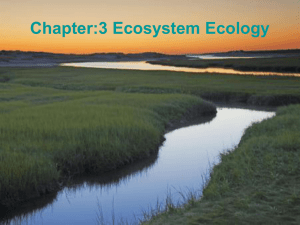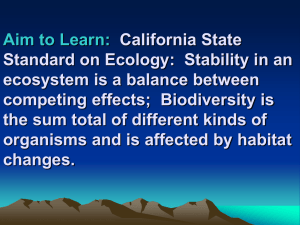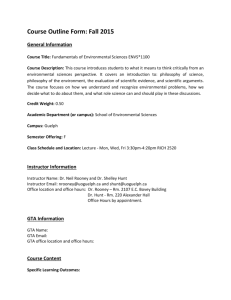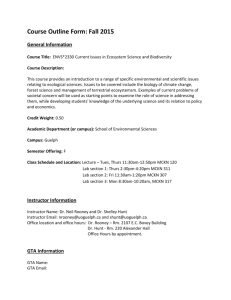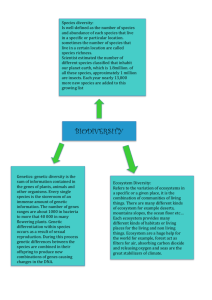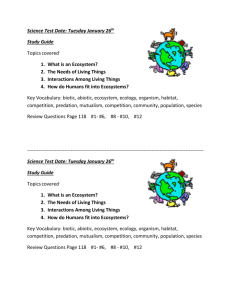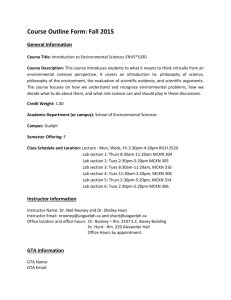ENVS*3370 Terrestrial Ecosystem Ecology
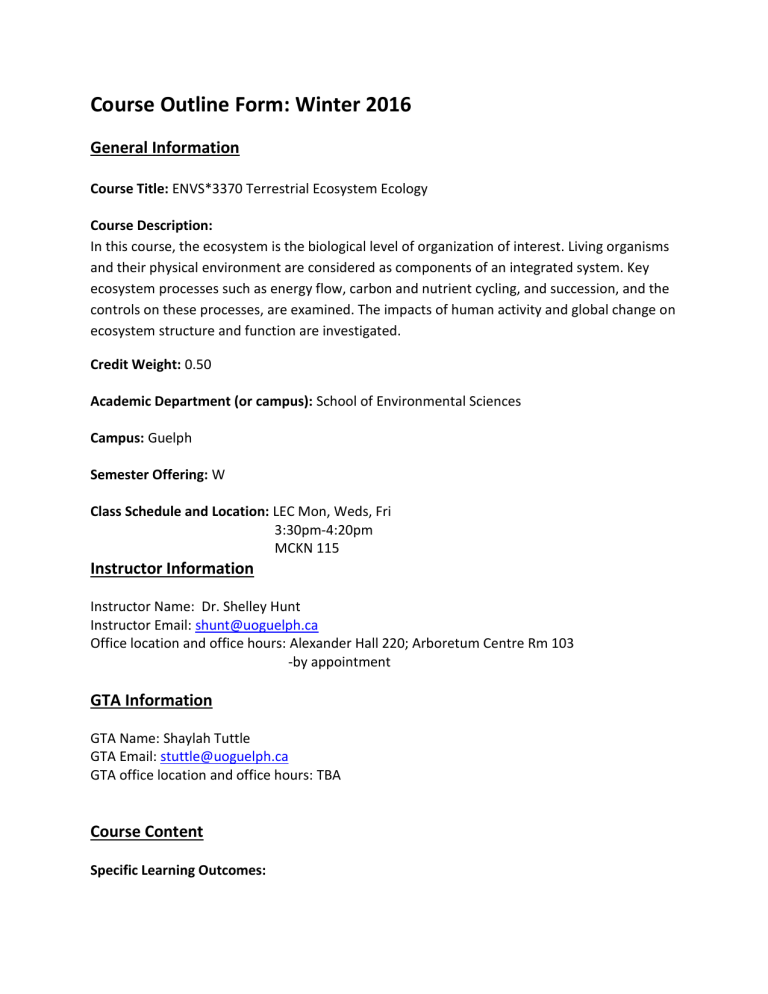
Course Outline Form: Winter 2016
General Information
Course Title: ENVS*3370 Terrestrial Ecosystem Ecology
Course Description:
In this course, the ecosystem is the biological level of organization of interest. Living organisms and their physical environment are considered as components of an integrated system. Key ecosystem processes such as energy flow, carbon and nutrient cycling, and succession, and the controls on these processes, are examined. The impacts of human activity and global change on ecosystem structure and function are investigated.
Credit Weight: 0.50
Academic Department (or campus): School of Environmental Sciences
Campus: Guelph
Semester Offering: W
Class Schedule and Location: LEC Mon, Weds, Fri
3:30pm-4:20pm
MCKN 115
Instructor Information
Instructor Name: Dr. Shelley Hunt
Instructor Email: shunt@uoguelph.ca
Office location and office hours: Alexander Hall 220; Arboretum Centre Rm 103
-by appointment
GTA Information
GTA Name: Shaylah Tuttle
GTA Email: stuttle@uoguelph.ca
GTA office location and office hours: TBA
Course Content
Specific Learning Outcomes:
Upon successful completion of the course, students should be able to:
• explain the major processes and mechanisms that control the flow and storage of energy and the cycling of material in an ecosystem (LO1)
• critically analyze ecosystem ecology-related ideas, issues, arguments and literature (LO2)
• apply quantitative analyses to ecosystem data (LO3)
• describe how human activity impacts ecosystems (LO4)
• understand how ecosystem ecology differs from other areas of ecology (LO5)
In addition, the course aims to meet some of the learning objectives developed by the School of
Environmental Sciences (SESLO) and the learning outcomes put forward by the University of
Guelph (UGLO):
• discover relationships within and between biotic and abiotic components of environments and their significance (SESLO1)
• demonstrate the ability to find and critically evaluate scientific information (SESLO2)
• effectively communicate ideas and information in graphic and written formats, while demonstrating fluency in the terminology of environmental sciences (SESLO3)
• choose and utilize appropriate quantitative and qualitative methods to analyze and interpret environmental data (SESLO4)
• demonstrate personal and professional integrity by respecting diverse points of view
(SESLO5)
• critical and creative thinking (UGLO1), literacy (UGLO2), communicating (UGLO3)
Students will have opportunities to achieve these objectives by completing the readings, assignments and exam, as well as by attending lectures.
Lecture Content:
Approximate Schedule of Lectures
Week 1 - Introduction to the ecosystem concept and systems thinking.
Week 2 - Primary productivity; ecosystem carbon dynamics.
Week 3 - Primary productivity; photosynthesis–nitrogen relationships.
Week 4 - Litter decomposition.
Week 5 - The nitrogen cycle. Nutrient cycling in general.
Week 6 - Climate change and ecosystem functioning.
READING WEEK
Week 7 - Ecosystem structure; the role of coarse woody debris.
Week 8 - Ecosystem functioning and biodiversity.
Week 9 - Temporal dynamics: disturbance and succession.
Week 10 - Human impacts on terrestrial ecosystems
Week 11 - Case studies: ecosystem-level experiments.
Week 12 – History of the ecosystem concept. Wrap-up and exam review.
Labs: N/A
Seminars: N/A
Course Assignments and Tests:
Assignment or Test Due Date
Online discussion post 1
Contribution to
Final Mark (%)
Mon. February 8 th 15%
Online discussion post 2
Data analysis assignment
Essay
Mon. February 29
Mon. March 14
Tues. March 29 th th th 15%
15%
25%
Learning Outcomes
Assessed
LO1, LO2, SESLO2, SESLO3,
SESLO5, UGLO1, UGLO2,
UGLO3
LO1, LO2, SESLO2, SESLO3,
SESLO5, UGLO1, UGLO2,
UGLO3
LO1, LO2, SESLO2, SESLO3,
SESLO5, UGLO1, UGLO2,
UGLO3
LO3, SESLO3, SESLO4
Final exam Mon. April 18
2:30pm-4:30pm
30%
Additional Notes (if required): N/A
Final examination date and time: Monday, April 18 th , 2:30pm-4:30pm
Final exam weighting: 30%
(includes the readings and studying of material in prep for exam) LO1, LO4, LO5,
SESLO1, SESLO3
Course Resources
Required Texts:
Chapin, Matson and Vitousek. 2012. Principles of Terrestrial Ecosystem Ecology, 2 nd Edition,
Springer, 529p.
One copy will be made available on Course Reserve at the library.
Recommended Texts: N/A
Lab Manual: N/A
Other Resources:
Other course material will be available online through Courselink.
Field Trips: N/A
Additional Costs: N/A
Course Policies
Grading Policies:
Assignments are to be submitted online via Courselink dropbox before midnight on the due date. Late assignments will be penalized with deductions of 10% of the full value per day late
(so, if an assignment is worth 30%, 3/30 marks will be deducted per day late. An assignment that is 5 days late is guaranteed to receive a failing grade). Exceptions to this rule require a note from your doctor or program counsellor. If you require an extension on an assignment, you must make a request to Dr. Hunt in advance of the due date.
Course Policy on Group Work: N/A
Course Policy regarding use of electronic devices and recording of lectures:
Electronic recording of classes is expressly forbidden without consent of the instructor. When recordings are permitted they are solely for the use of the authorized student and may not be reproduced, or transmitted to others, without the express written consent of the instructor.
University Policies
Academic Consideration:
The University of Guelph is committed to supporting students in their learning experiences and responding to their individual needs and is aware that a variety of situations or events beyond the student's control may affect academic performance. Support is provided to accommodate academic needs in the face of personal difficulties or unforeseen events in the form of
Academic Consideration.
Information on regulations and procedures for Academic Consideration, Appeals and Petitions, including categories, grounds, timelines and appeals can be found in Section VIII
(Undergraduate Degree Regulations and Procedures) of the Undergraduate Calendar .
Academic Misconduct:
The University of Guelph is committed to upholding the highest standards of academic integrity and it is the responsibility of all members of the University community, faculty, staff, and students to be aware of what constitutes academic misconduct and to do as much as possible to prevent academic offences from occurring.
University of Guelph students have the responsibility of abiding by the University's policy on academic misconduct regardless of their location of study; faculty, staff and students have the responsibility of supporting an environment that discourages misconduct. Students need to remain aware that instructors have access to and the right to use electronic and other means of detection. Please note: Whether or not a student intended to commit academic misconduct is not relevant for a finding of guilt. Hurried or careless submission of assignments does not excuse students from responsibility for verifying the academic integrity of their work before submitting it. Students who are in any doubt as to whether an action on their part could be construed as an academic offence should consult with a faculty member or faculty advisor.
Detailed information regarding the Academic Misconduct policy is available in Section VIII
(Undergraduate Degree Regulations and Procedures) of the Undergraduate Calendar .
Accessibility:
The University of Guelph is committed to creating a barrier-free environment. Providing services for students is a shared responsibility among students, faculty and administrators. This relationship is based on respect of individual rights, the dignity of the individual and the
University community's shared commitment to an open and supportive learning environment.
Students requiring service or accommodation, whether due to an identified, ongoing disability or a short-term disability should contact the Student Accessibility Services (SAS), formerly
Centre for Students with Disabilities (CSD), as soon as possible.
For more information, contact SAS at 519-824-4120 ext. 56208 or email sas@uoguelph.ca or visit the Student Accessibility Services website (http://www.uoguelph.ca/csd/) .
Course Evaluation Information:
End of semester course and instructor evaluations provide students the opportunity to have their comments and opinions used as an important component in the Faculty Tenure and
Promotion process, and as valuable feedback to help instructors enhance the quality of their teaching effectiveness and course delivery.
While many course evaluations are conducted in class others are now conducted online. Please refer to the Course and Instructor Evaluation Website for more information.
Drop period:
The drop period for single semester courses starts at the beginning of the add period and extends to the Fortieth (40th) class day of the current semester (the last date to drop a single semester courses without academic penalty) which is listed in Section III (Schedule of Dates) of the Undergraduate Calendar .
The drop period for two semester courses starts at the beginning of the add period in the first semester and extends to the last day of the add period in the second semester.
Information about Dropping Courses can be found in Section VIII (Undergraduate Degree
Regulations and Procedures) of the Undergraduate Calendar .
Additional Course Information
N/A
